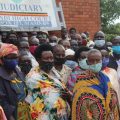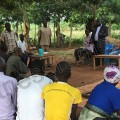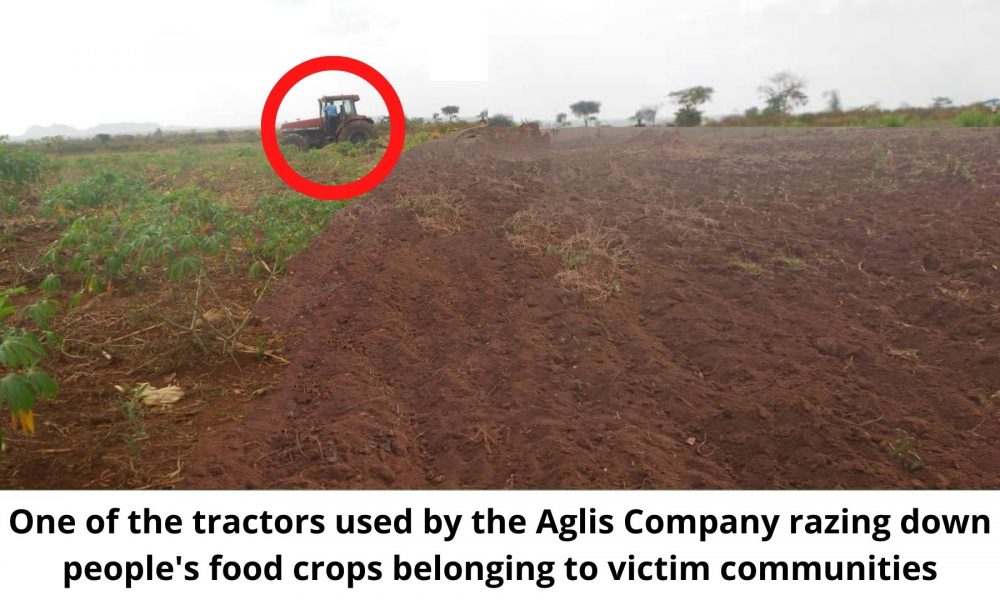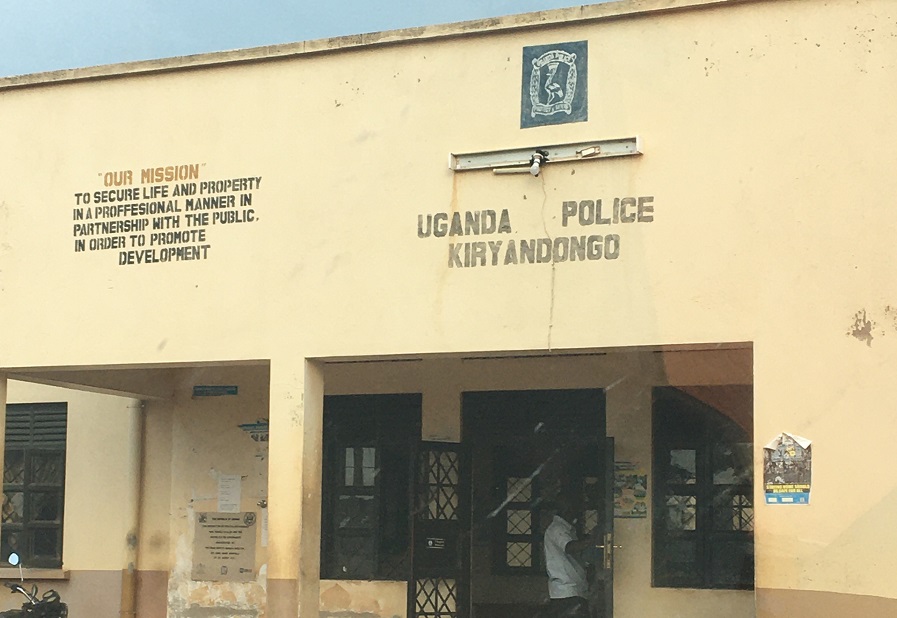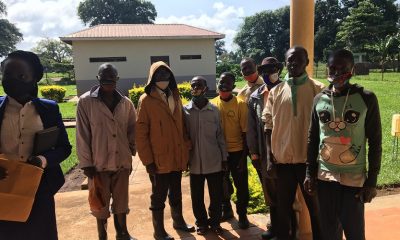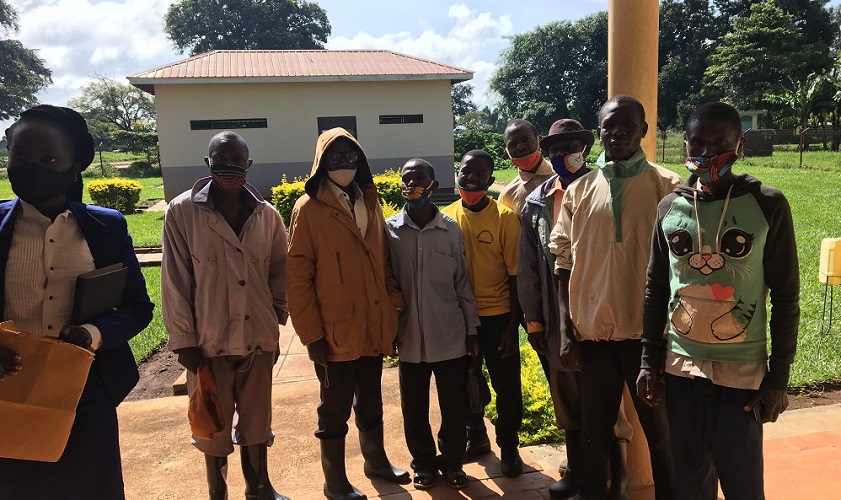In 2017, all hell broke loose when thousands of families in Kiryandongo district, Western Uganda started fleeing their homes for their dear lives. The move was triggered by the unabated brutal and forceful evictions orchestrated by multinational companies who acquired the interests in the said land for large-scale agriculture.
The eviction had far-reaching consequences on the community. It left broken homes and shattered dreams. Rape and defilement were among the underhand tools employed to break the resistance put up by the smallholder farmers. At all times, arrests, detentions and prosecution defined and still define the relationship between the evicted community and the multinational companies. Not even their lawyers were spared; they too were arrested and detained.
On 30th June 2020 in Busaana-Kimogola village, Kakooko parish, Mutunda Sub County, the Uganda Police Force (UPF) arrested seven lawyers and 6 land rights defenders while collecting evidence to support ongoing human rights enforcement cases against the multinationals: Kiryandongo Sugar limited, Agilis Partners Limited, and Great Seasons SMC Limited. The brutal and chilling accounts of the state’s excesses against its own citizens were detailed in a report, “Land Grabs at Gunpoint” by AFSA, GRAIN and Witness Radio – Uganda.
“UPDF Soldiers and police officers under the command of the former Kiryandongo District Police Commander Mr. Joseph Bakaleke and his predecessors. They caught us unaware and nobody expected this. We had never been consulted nor compensated. The area was cut off right from the main road and no car would access the eviction premises. No media or human rights defenders were allowed to access the entire villages. The inhuman actions were devastating”. said Joseph Walekula, one of the victims.
Despite a shocking report by three civil societies that revealed gross human rights abuses and violations in Kiryandongo by multinationals, the companies continue to violate the rights of the evictees unabated.
According to the report, more than 35,000 have been evicted by the companies. However, rights activists and land rights defenders claim the numbers are increasing due to the unending evictions. The 2020 report called for independent investigations into the matter and compensation for the affected families. To date, the demands have not been addressed!
But the shocking revelations persist. On 28th February, three armed Field Force Unit officers guarding Agilis partners plantations, led by Byaruhanga Francis, attacked 20-year old Talemwa Eliot in the wee hours of the morning and ordered him to vacate his land. He says he was questioned why he is still living in the company land.
“They came at around 2:00 am, they banged on my door and threatened to set it on fire if I do not open or come out. I opened it but they were armed with a gun and big sticks. I think they wanted to take my life. It was terrible. I had to fight one who had a stick and then ran. I managed to escape but still, they ran over me and hit me with a big stick,” Talemwa added.
He added that all his belongings including 200,000 Ugandan shillings (USD56.7) were taken, and mattresses, clothes, and other household items were thrown outside.
“They failed to catch me and decided to come back for my property at home. I found all of them out while the money had been taken.” he further said in an interview.
The attack on Talemwa happened barely 10 hours after terrible violence was committed at his parent’s home.
According to eyewitnesses, Mr. William Katusime and Namuganza Esther, both parents to Talemwa were violently evicted from their land by a group of 18 people consisting of 8 armed policemen, 7 security guards, and 3 soldiers. Their cassava plantation of 4 acres was destroyed.
“They came with a tractor registration number UAR 643K at around 4:45 pm on Saturday and destroyed everything. I had over 150 acres of land.” Katusime narrated.
These and other atrocities committed forced Walekula, Katusime, and other residents affected by the three companies’ forced evictions to petition the High Court of Uganda at Masindi to seek, among others, compensation for the violations of their human rights and the destroyed properties, and to halt the forced evictions.
Witness Radio Uganda through M/s Kiiza and Mugisha Advocates, helped the communities to file the applications seeking justice and and the return of their grabbed lands.
“We cannot sit while the companies are grabbing our land. We have been here for decades. Our families are broken. We are broke. People are dying. We have no food to eat because we are restricted from using our land. This is why we ran to court for our rescue in getting justice,” explains Mr. Otyaluk Ben Wilson, one of the affected residents in Nyamutende.
According to the lawyers, all the cases have been fixed for hearing at the High Court. The Masindi High Court fixed 20th April 2022 for hearing of Miscellaneous cause number 11 of 2020 of Joseph Mangfu and 11 others vs. Agilis Partners, 21st April for hearing case Miscellaneous Cause Number 12 of 2020 of Otyaluk Ben Wilson and 8 others vs. Kiryandongo sugar Company and 30th of May 2022 for hearing the application for Ssebisolo Godfrey, Miscellaneous cause Number 007 of 2020 vs. great seasons SMC limited company.
“This means a lot to us. We are happy for the success we have so far achieved. We thank our representatives for the support,” Joseph said.
Meanwhile, the Kiryandongo women affected by the forced evictions community have written to the US ambassador to Uganda, Ambassador Natalie E Brown, seeking a remedy and redress on the forced, violent, and inhuman evictions orchestrated by the Agilis Company that is funded by the US.
Represented by Akiteng Stella, the affected communities including Kisaranda, Kanani, Gologosa, kololo, Kamison, Kamigora, Techwa, Ndoi, Nyamuntende Sub- Counties: Mutunda and Kitwara claim they have extremely suffered as a result of the company’s excesses.
Residing on Ranch 20/21 in Kiryandongo, the community says their land was forcefully grabbed by the Agilis partners in 2017 and has since evicted them without following the necessary due process.
According to the letter, residents have been greatly disturbed and negatively affected by the projects they established in their community. It reads:
“…First and foremost, the company hires men who come from wherever and these men are busy raping my fellow women and, since most of them are not married, they end up satisfying their sexual [urges] by raping our women thus infecting them with sexually transmitted diseases like HIV/AIDS, Gonorrhea and Syphilis among others. Some of our young girls are raped and they end up becoming pregnant thus being forced to drop out of school.
They demolished our schools, hospitals, churches and destroyed our gardens too so we have no land for farming, and yet agriculture was a source of income.
After evicting us from the land, some of our husbands abandoned us with our children so without land for farming it’s really hard for us to be in a position to sustain our families.
Our water sources like wells were destroyed which has caused water shortage and those that are left are far and the path that leads us to the water sources are inaccessible and are risky because they are surrounded by plantations and the rapists usually use that opportunity to rape our women…”
…We are requesting you to give us audience so that we can air out our issues on how Agilis coming to our community has caused us a lot of suffering as a community, infringed on our human rights, greatly affected our lively hood and increased poverty to mention but a few yet we believe these projects are meant to better our lives. We also request you to carry out investigations on the company whose projects you’re funding because it is not exhibiting American values. Is this company whose employees’ rape and defile American?”
Brief background about the multinational companies.
Agilis partners.
Agilis Partners is owned by twin brothers from the US, Phillip Prinz, and Benjamin Prinz. In 2013 the brothers established Joseph Initiative, a maize trading company that sources from a network of out-grower farmers in Masindi District who were previously doing contract production for British American Tobacco.
The Joseph Initiative has received financial support from several sources. In 2013, it received a US$1.5 million equity investment from the Dutch billionaire De Rijcke family, via its registered charity in the UK, Dutch OakTree Foundation, and DOB Equity (DOB Foundation), a private equity vehicle that manages the “charitable” investments of the De Rijcke family.
In 2017, Dutch Oak Tree sold its minority shares in Joseph Initiative to Agilis Partners but remains involved in the company through a loan that is due in 2022.
In 2013, Joseph Initiative also received a $500,000 loan from the United Nation’s Common Fund for Commodities (CFC), via the Dutch Trust Fund arrangement set up by the Netherlands Ministry for Development Cooperation to support CFC projects with co-financing contributions.10 And in 2014, the UK DFID funded Food Trade program granted Joseph Initiative £981,311(US$1280, 59), under a 3-year project.
Kiryandongo Sugar
Kiryandongo Sugar is owned by members of the powerful Rai family, a Kenyan-based business group that owns numerous plantation, food, metals, and timber companies in east and southern Africa. Over the past decade and a half, the Rai Group has become one of the continent’s largest players in the production and import of sugar. Several of its sugar companies are involved in land conflicts, including the displacement of 5,000 people by Hoima Sugar Limited in Kijayo, Uganda.
Great Seasons SMC Limited
Great Seasons SMC Limited, owned by Sudan’s investor based in Dubai. Company records indicate only that it is owned by one Yasir Adam Ahmedai Abdalla.
Original source: Ugandan Land Defenders Via Farm Land Grab
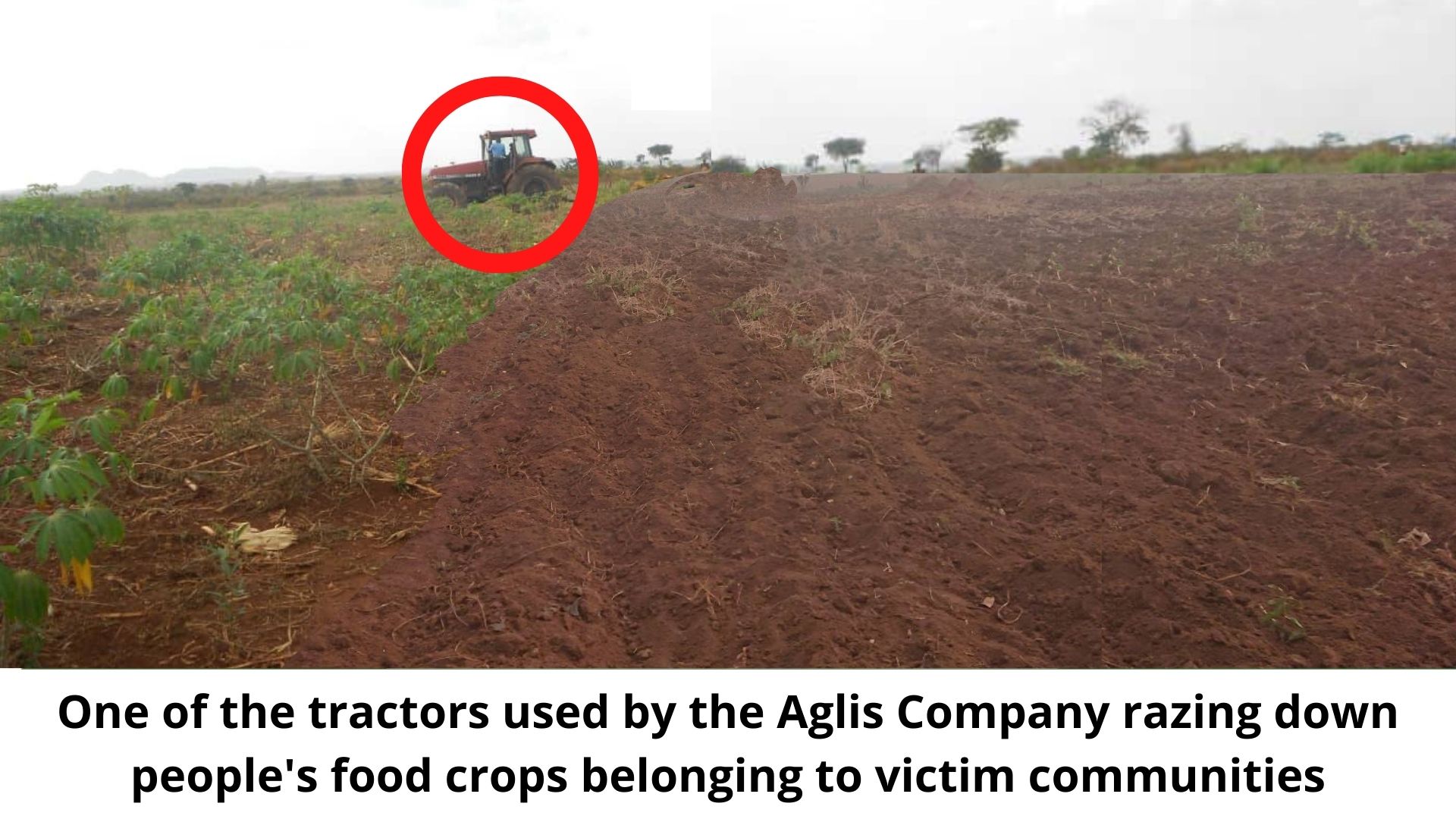

 NGO WORK2 weeks ago
NGO WORK2 weeks ago
 MEDIA FOR CHANGE NETWORK2 weeks ago
MEDIA FOR CHANGE NETWORK2 weeks ago
 MEDIA FOR CHANGE NETWORK2 weeks ago
MEDIA FOR CHANGE NETWORK2 weeks ago
 MEDIA FOR CHANGE NETWORK2 weeks ago
MEDIA FOR CHANGE NETWORK2 weeks ago
 MEDIA FOR CHANGE NETWORK2 weeks ago
MEDIA FOR CHANGE NETWORK2 weeks ago
 MEDIA FOR CHANGE NETWORK7 days ago
MEDIA FOR CHANGE NETWORK7 days ago
 MEDIA FOR CHANGE NETWORK1 week ago
MEDIA FOR CHANGE NETWORK1 week ago
 MEDIA FOR CHANGE NETWORK2 days ago
MEDIA FOR CHANGE NETWORK2 days ago

